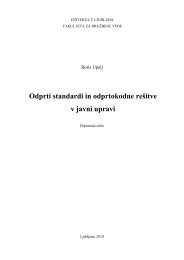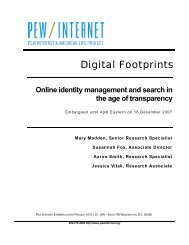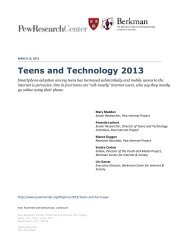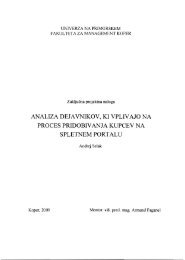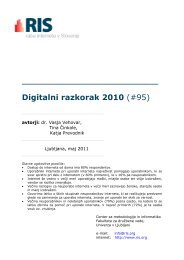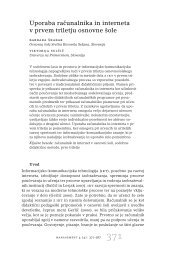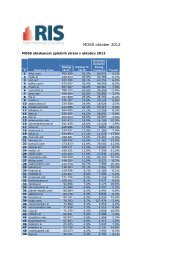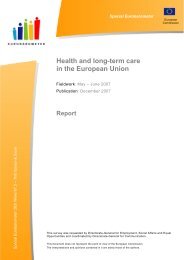the Labour Market Survey Report - Council of European ...
the Labour Market Survey Report - Council of European ...
the Labour Market Survey Report - Council of European ...
You also want an ePaper? Increase the reach of your titles
YUMPU automatically turns print PDFs into web optimized ePapers that Google loves.
4.4 IT Practitioners in Ireland<br />
The Irish economy saw remarkable growth over <strong>the</strong> late 1990s, and part <strong>of</strong> this undoubtedly arose from<br />
<strong>the</strong> notable success <strong>of</strong> high-tech industries. This emerged in part from <strong>the</strong> establishment in Ireland <strong>of</strong><br />
<strong>European</strong> bases <strong>of</strong> a number <strong>of</strong> growing IT companies from North America (in particular <strong>the</strong> United<br />
States). This was quickly augmented by <strong>the</strong> flowering <strong>of</strong> an “indigenous” industry within <strong>the</strong> new<br />
Technologies, including what is viewed as <strong>the</strong> e-Business (“Born-on-<strong>the</strong>-web” e-commerce- and Internet<br />
Data Centre- enterprises) and Digital Media (incorporating Commercial/ Corporate Digital Media-,<br />
Education and Training media- and Entertainment Digital media- companies) sectors.<br />
The very strong growth in demand for IT (and o<strong>the</strong>r) skills arising from this economic growth caused<br />
<strong>the</strong> Irish government to set up in 1998 an “Expert Group on Future Skills Needs”, which presented three<br />
reports, <strong>the</strong> third <strong>of</strong> which, in 2001, drawing on <strong>the</strong> earlier primary research, and on expert opinion<br />
elicited through a series <strong>of</strong> workshops, included a significant review <strong>of</strong> <strong>the</strong> position and set <strong>of</strong> policy<br />
recommendations, based in particular on <strong>the</strong> findings <strong>of</strong> three commissioned reports (“Third <strong>Report</strong> <strong>of</strong><br />
Expert Group..”, March 2001), that focused on:<br />
a) <strong>the</strong> skill needs <strong>of</strong> <strong>the</strong> S<strong>of</strong>tware Industry, demand for s<strong>of</strong>tware skills across <strong>the</strong> economy and <strong>the</strong><br />
emerging areas <strong>of</strong> e-Business, digital media and multi-media (from McIver Consulting)<br />
b) <strong>the</strong> changing skills requirements and overall demand for skills in <strong>the</strong> hardware sector (from<br />
Eirlink), and<br />
c) labour market projections and forecasts for <strong>the</strong> supply <strong>of</strong> “third-level” graduates in IT (from<br />
ESRI)<br />
The main policy response focused on estimating <strong>the</strong> likely number <strong>of</strong> “third-level” skills provision up<br />
to <strong>the</strong> year 2005. The forecasts were driven by assumptions about <strong>the</strong> growth in total employment for<br />
<strong>the</strong> industry sectors involved – with each (supply) sub-sector considered in some detail as well as <strong>the</strong><br />
expected demand within user industry (“wider economy”) sectors. The initial estimates produced for <strong>the</strong><br />
First <strong>Report</strong> led in 1999 to additional public investment in a) 5,400 IT-related third level places, b) 1,100<br />
IT places on <strong>the</strong> “Accelerated Technician” programme, and 1,500 places on post-graduate IT-conversion<br />
courses.<br />
The Expert Group continued to monitor <strong>the</strong> situation, and on <strong>the</strong> basis <strong>of</strong> a deeper analysis and in <strong>the</strong> light<br />
<strong>of</strong> developments, <strong>the</strong> Third <strong>Report</strong> proposed an adjustment in <strong>the</strong> provision as between IT Pr<strong>of</strong>essionals<br />
and Technicians, with a small shift <strong>of</strong> funding resource from technicians to those with degrees.<br />
The analysis on which <strong>the</strong> forecasts were prepared was based on secondary research, looking in<br />
particular employment trends in Ireland and o<strong>the</strong>r countries, and on a new survey <strong>of</strong> employment within<br />
web development companies. Early estimates were reviewed in workshops with <strong>the</strong> relevant industry<br />
bodies and agencies. The forecasts <strong>the</strong>mselves assumed annual growth in <strong>the</strong> indigenous s<strong>of</strong>tware<br />
industry <strong>of</strong> 25% between 2001 and 2005, and took a figure <strong>of</strong> an annual increase <strong>of</strong> employment in<br />
“overseas owned” s<strong>of</strong>tware companies <strong>of</strong> 2,300 over <strong>the</strong> same period. Increases assumed for <strong>the</strong> o<strong>the</strong>r<br />
sectors considered (Digital Media and e-Business) were also relatively high, although from a significantly<br />
smaller base, and it was assumed that employment (in IT departments <strong>of</strong>) User Organisations (<strong>the</strong> “wider<br />
economy”) would grow at some 1,600 per annum. It was felt that significant growth in this employment<br />
would occur “even in <strong>the</strong> event <strong>of</strong> a severe slowdown”.<br />
C E P I S I.T. PRACTITIONER SKILLS IN EUROPE | Section 4 | 45



